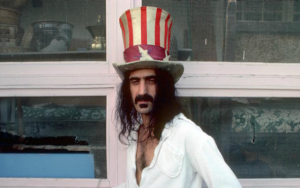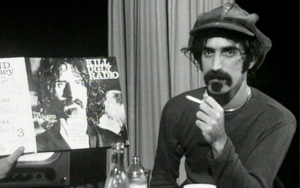Metro: Daughter complex and ‘fastball’ life of growing up with Frank Zappa
 By Richard Crouse – Metro Canada
By Richard Crouse – Metro Canada
Moon Zappa, daughter of the late, great musician Frank Zappa says, “Growing up I hated sharing him with the fans.” Or anybody else it seems.
“I once brought him to show and tell when I was in third grade,” she says. “I was so excited to share my dad with the class. Then he spent the whole time tickling all the other children. I was furious but they loved it.”
Maturity has brought a different perspective and now the forty-eight year old is sharing her life and her iconoclastic father with the world as she helps promote a new documentary that covers his creative life and times. Eat That Question: Frank Zappa In His Own Words uses a collection of archival interviews and television clips to paint a word portrait of Zappa sans any context, voice over or other documentary tricks.
“He did speak to the underdogs and he did illuminate many minds,” she says. “You have a little taste of him and you want more. You want to have him all to yourself and I certainly had that feeling. Now I like sharing those stories but at the time I thought I really want him all to myself.”
By the end of Eat That Question’s running time a picture has been painted of a man who self describes as a freak and a conservative, a family man and an out-of-the-box musician who played by his own rules.
“He definitely had a regular life,” says Moon, the oldest of four Zappa kids. “He was a quiet, shy man who thought he was ugly, who couldn’t cook, who deflected with humour and who couldn’t really have a confrontational conversation. He always struck me as a Sicilian patriarchal kind of parent. As an adult I went, ‘Of course that is ridiculous. Of course he had this other life.’ For example I knew he had cheated a few times, but I didn’t realize the magnitude of the cheating. From one perspective it’s a fantastic rock and roll perk, but for a daughter it feels pretty crappy to have a cheater dad. That is something I am reconciling. I also have tremendous respect for him but it’s all so confusing.”
Moon, formerly known as Moon Unit, tasted her father’s fame as the “grody to the max” vocalist of Frank’s Top 40 hit Valley Girl but says she craved a normal life.
“I longed for structure,” she says. “When I saw John Hughes films I was, ‘Wait! People sit at a dinner table? Wait! People say sorry?’ Even to this day when I see somebody with a sweater draped over their shoulders, or a loafer or an exposed ankle, I’m like, ‘That is so exotic.’ I think if I had grown up in the repression my father encountered I would also have put two rocket boosters on my back but growing up like that was too much. It was like fastball pitches every single minute.”
The elder Zappa was a complex man, but Moon says Eat That Question “is exactly how I wish the world could perceive him.”
“This one for me really tells the story of my father answering his calling and the stamina required to see a dream through. That is a human story. That’s why I think his story connects on a human level. It’s universal.”

